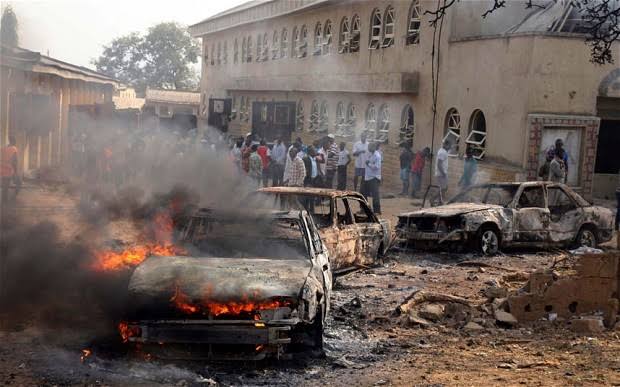Nation
Insecurity: Knotty issue President Tinubu has yet to tackle

Insecurity has remained one of Nigeria’s most stubborn and intractable problems, weighing heavily on the administration of President Bola Ahmed Tinubu nearly two years into his tenure. Despite a staggering N4.91 trillion allocation to defense and security in the 2025 fiscal year, the crisis persists with alarming intensity, casting a long shadow over the nation’s stability.
Governor Babagana Zulum of Borno State recently raised the alarm over resurgent insurgent activities, revealing that three local government areas had fallen back under Boko Haram control. His warning came shortly after deadly drone attacks on military forward bases, which resulted in at least 14 casualties.
The security situation continues to hinder Nigeria’s development across all sectors—economic, political, infrastructural, and social. Food insecurity, in particular, has worsened as bandits and armed herdsmen overrun farmlands in the North and parts of the South, including Ebonyi, Ondo, and Enugu states.
Widening Threats and Military Failures
Since the Boko Haram insurgency erupted over a decade ago in Borno State, insecurity has morphed into banditry and widespread kidnapping. The once isolated farmer-herder clashes now seem trivial in comparison, as violence has spread across the entire North and into Southern Nigeria.
Insurgents, once confined to the Sambisa forest, have grown bolder—launching successful assaults on military installations and displaying superior firepower. Their enhanced capabilities are largely attributed to the influence of the Islamic State of West Africa Province (ISWAP), which is believed to be backed by ISIS and intent on establishing a stronghold in Nigeria and the broader Sahel region.
Sabotage from Within
Governor Zulum has also expressed concern over suspected informants within the military, government, and local communities, providing crucial intelligence to terrorists. This concern echoes similar claims by former President Goodluck Jonathan in 2014.
Despite the United Arab Emirates submitting a list of 400 terrorist financiers to the Nigerian government during Muhammadu Buhari’s presidency, no visible action has followed—a silence that has fueled frustration and suspicion.
Buhari, a retired general, had come to power with promises to end insecurity. But under his administration, things deteriorated further. Some have blamed the influx of foreign mercenaries allegedly brought in for electoral purposes, who became unmanageable post-election and may have worsened the crisis. Fulani militias also emerged, accused of violent land grabs, deepening ethnic and regional tensions.
Controversial Policies and Southern Resistance
The Buhari government was accused of promoting a “Fulanization” agenda through initiatives such as the Ruga settlement policy and livestock and waterway legislation. These faced strong resistance from Southern and Middle Belt states, intensifying regional suspicions.
Tinubu inherited this volatile legacy. While his government claims improvements have been made, ongoing attacks and massacres in Kaduna, Niger, Plateau, and Benue states suggest otherwise. The continued migration of displaced Northerners into Southern regions has sparked concerns in the South-West, South-East, and South-South, with local leaders urging vigilance.
Rise of Regional Security Outfits
Amid federal shortcomings, regional security outfits have gained prominence. In the South-East, however, Ebubeagu has struggled due to political disunity, with states preferring their own structures—Anambra’s Agunechemba and Abia’s Operation Crush, for instance. In the South-West, the Amotekun corps remains the cornerstone of community defense.
Akintayo Akindeko, chairman of the Majeobaje group in the South-West, warned that displaced terrorists are now infiltrating the region, taking menial jobs or hiding in forests to attack farmers. He urged state governors to urgently reinforce Amotekun.
Afenifere’s National Publicity Secretary, Comrade Jare Ajayi, echoed the call for decentralization of policing. “It’s time to allow states to establish their own police forces. A bill for constitutional amendment should be sent to the National Assembly to legalize multi-level policing,” he said.
Economic Roots and Foreign Links
Experts, including Adeola Soetan of the Citizens Civil Awareness Centre, argue that insecurity is driven by Nigeria’s worsening economy, which pushes many into crime to survive. While President Tinubu has urged defense chiefs to step up, recent statements from governors and military spokesmen paint a troubling picture.
Benue State Governor Hyacinth Alia recently said foreign herders were exploiting ECOWAS protocols to unleash terror on his people, while Borno’s Governor Zulum alleged internal sabotage. Major General Markus Kangye of the Defence Headquarters admitted that attacks in Benue and Plateau are linked to porous borders and foreign infiltration—suggesting a growing international dimension to Nigeria’s security crisis.
Observers say such admissions reflect a lack of control and strategy, further casting doubt on the effectiveness of Tinubu’s security approach.
Need for Accountability and Urgency
Analysts insist that Tinubu must demonstrate decisive leadership and ensure full accountability for the N4.91 trillion earmarked for security in the 2025 budget. With widespread reports of past defense allocations being diverted or mismanaged, public confidence remains low.
According to the Stockholm International Peace Research Institute, Nigeria may have lost around 200,000 people—both civilians and military personnel—to violent conflict between 2019 and 2025. As Tinubu enters the second half of his tenure, the need for concrete action on security has never been more urgent.
If he intends to seek a second term, he must move swiftly to stabilize the nation, restore public trust, and finally break the back of the monster that insecurity has become.






